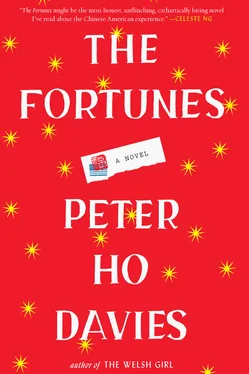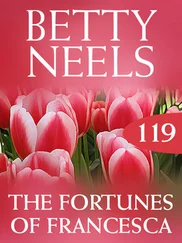She should resent him, but he’s been kind to her in the past, run lines with her and helped her hit her marks, and she respects him. He’s classically trained, has performed Shakespeare onstage and his own translations of Strindberg. She’s hopeful he’ll put in a good word for her with the authorities, help her on her way to her father.
She arranges to meet him for dim sum. Oland, despite the boast that he’s known as “one-take Warner,” is a famed drunk. The producers on the Charlie Chan pictures are said to encourage his boozing, thinking it adds to his character’s air of serene geniality. So Warner claims, at least. He calls it his method; his favorite toast is “Action!” She thinks dim sum will be too early for him to be drunk, but she’s only half right. He arrives sober enough, in a natty cravat and houndstooth suit, but proceeds to drink through lunch, filling his teacup from a silver flask. “Let’s get in character,” he says, raising it to Newsreel’s camera.
“Rotten luck,” he tells her, “about The Good Earth. They say Luise will win the Academy Award for The Great Ziegfeld, you know. They’re calling her the ‘Viennese teardrop.’”
“Well, that’s just ducky. She’ll probably win it for The Good Earth too.”
He is concentrating on his chopsticks. “Could be.”
“That should be my award!” Doug, as the original president of the academy, had presided over the first ceremony, in 1929. Mary Pickford, Irving Thalberg, and Sid Grauman had been among the other founding members. She’s never been invited to join.
Jack laughs. “But you wouldn’t win it, daughter.”
“Why not? I’d be better in the role than her.”
He chases a slippery dumpling around his plate. “Of course. And that’s why you wouldn’t win. Don’t you see? If she wins, it’ll be for acting Chinese. You are Chinese! Take it from me. The people here don’t hold it against me that I played Fu Manchu. That was acting. But you, they revile for playing his daughter.” He gives a sidelong glance around the restaurant at the other patrons, staring at them.
“I act!” she hisses, remembering how once at a party someone had asked her if inscrutability and acting weren’t mutually exclusive.
“No, daughter. No. You are a star. What you always wanted to be, yes? To see your name in electric lights? Then don’t complain. Stars don’t act, they play themselves. Gable is Gable, Lombard is Lombard. Onscreen and off, for the most part. That’s why we love them, not just because they’re the same but because they seem real, not fake. What do you think all the movie magazines are for? You can’t blame people for confusing you and your parts. And very lovely parts they are, by the way. Ah!” He finally spears the dumpling with his chopsticks.
She pauses demurely for the waiter to bring the next dish. He lifts the lids of the bamboo steamers with a little flourish, like doffing a hat.
“But what about you, Jack? Aren’t you a star?”
“Oh my dear, how kind of you.” He dabs his greasy lips. “But no. They don’t cast stars in yellowface, don’t you know. It spoils the illusion. Why do you think they use so many Europeans? We’re not so recognizable. Besides, honorable Mr. Chan is star, I only humble servant. You no believe? I can be replaced like—.” He snaps his fingers, and a waiter looks over. She waves him off. “Already there’s talk of a Chinese-language version of Chan. True, true. I met the fellow who will play him — play me, I should say, since he plans to impersonate my performance.”
She has heard of a Chinese remake of The Thief of Bagdad called The Flying Bandit. She wonders about the Chinese they got to play her.
“A Chinaman playing a Swede playing a Chinaman!” Jack guffaws. “What’ll they think of next?” He played Al Jolson’s disapproving father in The Jazz Singer, she recalls suddenly. Jewface, he called it once.
He applies himself to his dim sum. His cheeks are flushed, shiny — from the steam or more likely the drink ( Why can’t he just hold it? ) — and his cravat spotted. Shumai, he declares, remind him of Swedish meatballs, but he struggles to eat them. He’s never mastered chopsticks (“Mr. Chan too busy detecting to eat!”). At one point he looks up at her across the table, steepling his fingers, “Channing it up,” as she’s heard him describe it: “Ah, vely cunning plan, daughter. To remind fellow diners that Chan actor not real Chinese. One might almost think you wish him lose face.” He toasts her. “Or yellowface, at least.”
She denies it, but he has the sleepily satisfied look of a man who’s cracked the case, the look that has made him an icon.
In interviews later on his tour, when asked about his lunch with her, “Mr. Chan” will smile and bow and call her his “number-one daughter.” Gee, Pops, she says to herself, but she knows he’s only trying to help.
CELESTIAL BODY
She isn’t a star, she thinks later. Or an actress. But something in between. The first Chinese star, they call her, and it’s the qualifications that are crucial. First. Chinese. A star may play only him- or herself, but she is supposed to play a race. How can she be herself and represent millions, both at once? And who does she represent them to? To themselves or others? Who does she think she is? an outraged Nationalist critic has demanded. She wishes she could say.
Not a star, then. A star gives off its own light. Another celestial body, a moon, reflecting others’ light.
YELLOWFACE
Her pal Jimmie Wong Howe (Newsreel is an admirer of his namesake’s work; she likes to drop his name) calls them “sticky-tape” actors on account of the makeup people’s trick for slanting their eyes. “Only Warner has never needed it,” she tells Newsreel. He’s gathering his clothes; he never spends the night in her room. Sparing her the gossip, she thinks, though it’s a bit late for that.
“Something to do with his Lapp ancestry, supposedly,” she goes on. “At least that’s what Jack tells the movie magazines. He just trims his eyebrows and smoothes down the tips of his mustache and he’s passable.”
Newsreel looks dubious. He’s a reporter, after all; his business is with the real, not the fake. But then what is he doing with her?
“You’d be surprised,” she tells him, just prattling now to make him stay. Once on the set of Shanghai Express a wizened grandpa, an extra, approached to ask if Jack had grown up in such-and-such a village in Canton, as if they might be old chums. She translated for them, explaining politely that Warner was Swedish, explaining politely what Swedish was, Jack all the time nodding and bowing and twinkling with amusement. Acting! he’d crowed afterward.
That old grandpa was probably half blind, she thinks now, though at the time she had marveled at Warner, the alchemy of performance.
Newsreel shakes his head. Nearly dressed now. He’s forgone his usual Western attire lately for a Zhongshan suit, she notices. She reaches for him, but he shakes his head again.
“Not acting,” he says. “Not sticky tape or trimmed eyebrows. It’s you.”
“Me?” She smiles coyly, anticipating a gallantry.
“You make him Chinese. He stands next to you, he looks Chinese. You’re his yellowface.”
His, she will think after Newsreel leaves, and Olivier’s, and Lon Chaney’s, and Orson Welles’s (even on radio, a white played Chinese). Once, years earlier, Jimmie had shown her a grainy print of one of the very earliest films, Edison’s Chinese Laundry Scene from 1894, a slapstick short featuring a Chinese (played in yellowface) fleeing a policeman.
Читать дальше












